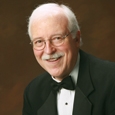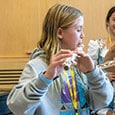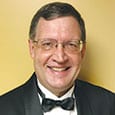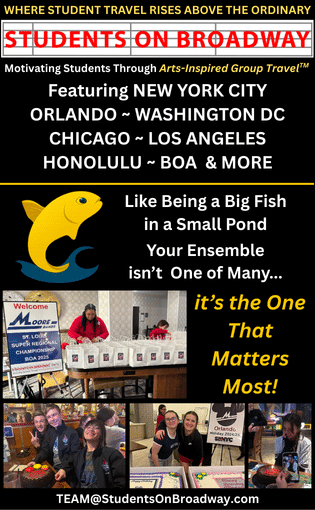As a young trumpet player with a poster of Bud Herseth on his wall, James Stephenson dreamed of a career as a performer. While he happily achieved his early goal, and played trumpet for 17 seasons with the Naples Philharmonic, his musical path eventually led in another direction. Through a combination of courage, creativity, and openness to inspiration, he has become an award-winning composer with a full slate of commissions. Leading American orchestras, instrumentalists, and wind ensembles around the world have performed his music. He is also a sought-after arranger and guest conductor. He earned a degree in trumpet performance from the New England Conservatory of Music. He and his wife Sally have four children.
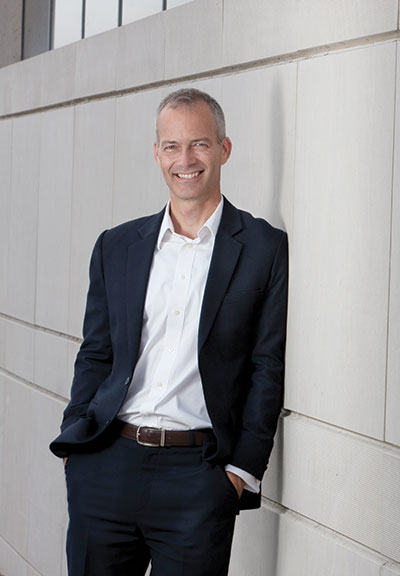 How did you become a full-time composer?
How did you become a full-time composer?It was a complete accident. I wanted to play trumpet since I first picked up the instrument at age nine. I began playing in the Naples Philharmonic right out of college and thought I would do it for a lifetime. I started arranging music first for our brass quintet because I raised my hand and said I would do it. I still don’t know why I volunteered.
Erich Kunzel, our pops conductor, heard my brass quintet music and asked me to arrange a Christmas tune for the orchestra. That set me down the path to writing for orchestra, with the occasional mistakes along the way. He sent me CDs by FedEx and asked for arrangements just days later. With just a CD as a guide, I started listening, transcribing, and arranging. That increased my interest in writing, and eventually turned into composing. Over the next 14 years, composing became more interesting, and trumpet playing became subservient.
I heard that you took a class called Adventures in Bad Music and that has somehow contributed to you heading down the path of composing.
I took a class at Northwestern University during a summer break from the Naples Philharmonic. The class consisted of sitting in a room and analyzing what we thought was bad music. Someone would raise their hand and say “I heard this tune on the radio and hated it.” Then we discussed why each of us hated or liked that piece of music. Our final assignment was to compose a bad piece of music, which gave us so much freedom to write whatever we wanted. I sat at a table without the help of a piano or my trumpet or anything. I just wrote a trumpet duet without caring about the result.
I played it with a friend for class, and someone raised their hand and said “Jim, that was a cool piece.” I wish I could remember who said it because that one comment sent me down the road towards composing. To this day, I do not worry about what my music sounds like when I first start writing it. I just write. This prevents writer’s block from happening and gives you so much freedom to not worry if it’s perfect right away. I try to teach that whenever I can. You need to get the brain muscle working and can always edit later.
What is the most rewarding part of composing full time?
The most rewarding part is when something comes out during the composing process that you never would have predicted. All composers seek that. When we find it, you’re in a room all by yourself. It’s just that private moment that gives you chills or makes you tear up. I think this happens in every profession. It’s not about fame or fortune. It’s just this challenge within yourself that you superseded in an unexpected way.
How does your creative process begin?
Usually it begins with an idea that overtakes my mind and says the piece needs to be exciting or solemn, rhythmically jarring or even harsh. Once I have discovered the underlying tone, I look for the notes and melodies to achieve what is in my conscious or unconscious mind. Then, I start writing (sometimes bad) melodies or harmonies to move towards that general feeling for the piece. There may be a couple of uneasy days when I’m in a bad mood until I find it, but once I do, I’m off to the races. Often ideas come out of a conversation with whoever is commissioning a work. They’ll say “Jim we want to have this,” and I instantly know what the piece should be. It is usually not when I’m sitting at the computer or piano. By the time I get to the computer or piano, I already have an idea of where I want it to go.
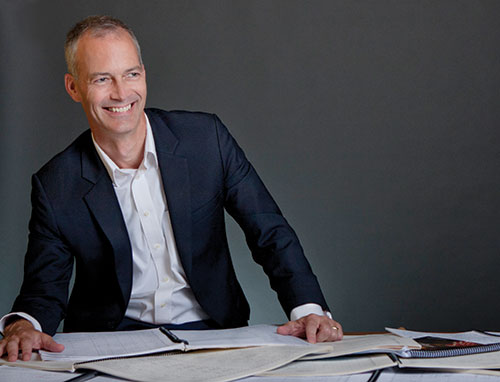
Do you compose at the piano or computer?
I performed for a long time and never want to lose that sense of being a performing musician. So, even though I’m not a great pianist, at some point, I will always head to a keyboard to create and hear the music. It’s dangerous to have a computer that can play anything we put on the page. I want to make sure I let music breathe and sing, to feel what it’s like to give a slight pause before moving on to the next measure. I don’t play trumpet anymore, so I need some instrument to keep that feeling alive.
How would you advise students who want to follow your footsteps as a composer?
First, don’t follow my footsteps – of course – create your own. I love the idea of making mistakes without fear and learning from them. They become part of your repertoire, your toolkit. It is important to keep learning. I’m in my 50s and know that I will be learning until the day I stop composing. That keeps it interesting.
I tell students to always strive for perfection but to understand that five or ten years later, you look back and say “I’m in a different place now. What was I thinking back then?” It doesn’t mean what you wrote was wrong, but we all grow and change. If you are going to be a composer, you have to find your own creative way to make a career at it. We all have distinctive personalities and strengths that make us attractive to other people who want to collaborate. Keep at it, find your path, and have the confidence and faith in yourself to get to work and make it happen.
I once asked a friend who works in sales for advice that could apply to composers. He said that the key to selling yourself is to get in front of people and build relationships. It’s easy as a composer to sit in a room and distance yourself from the real world. We have to get out there. You don’t have to be an obnoxious nagging salesman, but it is essential to attend concerts and conferences and meet conductors, musicians, and artistic administrators with similar interests. All sorts of composition projects have come out of contacts I made over the years.
Your diverse compositional output includes symphonies, concertos, chamber works, and sonatas written for nearly every instrument. Do you have a favorite compositional mode?
At this point in my career, I love the larger scale works with a full orchestra or wind ensemble. These projects put so many colors at my fingertips and allow me to tell a story over a longer period of time. I have written a ballet score, a few symphonies, and am about to write my first opera. I want to write more music where I can develop characters and a thread that takes 30 to 90 minutes to develop. That’s what I enjoy the most.
You have written many works for solo instruments. How do you prepare to compose a work for a solo instrument?
If someone were to dig into my catalog of sonatas and concertos, they would find that every piece has a unique character and style. When I write a solo piece for someone, I’m very interested in the personality and the unique talents of that individual. That all becomes the identity of the piece. You get something about one person’s technical skill and strengths and then on another piece, you draw on the personality of the performer. When I worked with Chicago Symphony bass trombonist Charlie Vernon on my first bass trombone concerto, he was involved in the entire process, and that dialogue shaped how the music sounds. With other concertos, like my first violin concerto for Jennifer Frautschi, for example, I wrote the entire piece and gave it to the soloist. There was very little interaction. I don’t mean that in a negative way – that was just the way that one worked out. I knew the person I was writing for, and I wrote it to her skills. Every piece is unique because of those relationships.
The San Fransisco Ballet recently premiered your Wooden Dimes. What were the challenges of composing for dance?
This may have been the most fun I have ever had on a project. I love telling stories, particularly when I am inspired by material that takes me in a new direction. The project began completely out of the blue. I’ll never forget it. My wife and I were driving to a recital in Chicago by Gene Pokorny. We were parking when I received an email titled “San Francisco Ballet Commission.” I though it might be a joke. The conductor of the ballet wrote: “Our choreographer discovered your music, and she’s got this project. Would you be interested?” I was interested, for sure!
Choreographer Danielle Rowe sent me 19 simple pencil sketches. Each page depicted a scene in the ballet and stated the number of minutes allotted for each one. She told me the story over the phone, and I wrote music based on what I thought she had in mind. It ended up sounding like a Vaudeville ballet, which really appealed to me. I was comfortable writing in that style because of my arranging background. I wrote scene after scene and sent her little computerized performances. She responded with suggestions but liked most of what I had written. We ended up with a ballet, and I hope to do more in the future.
How did the choreographer learn of your music?
She heard a piece I wrote for young audiences called Compose Yourself. Her young daughter liked the music and wanted to know what it was. She listened to more of my music and sent samples to the conductor, who also liked what he heard. They decided that I was the guy to do that gig.
Your second symphony, Voices, has received two prestigious awards and has been recorded by the Marine Band. What was the inspiration for that work?
I have good friends in the Marine Band and have so much respect for Colonel Jason Fettig. He approached me in the fall of 2015 and asked if I would write a work for their performance at the Midwest Clinic in 2016. He said I could write any piece I wanted, which is the dream commission for a composer. When I started writing the piece in the spring of 2016, my mother had just passed away. This was my first close personal loss. I thought that writing music would be easy, but this was probably the worst case of writer’s block I have ever had. I couldn’t figure anything out.
I finally sat down at the piano and just shouted with the music. The symphony starts with a big chord, which was me expressing my grief. I decided to make the whole piece a quest to deal with that grief. I started with an Eb and I wouldn’t get back to Eb until I had figured out how to write the music. The piece spans twenty minutes of me trying to go from Eb back to Eb, which was a creative and technical challenge that stretched me. Dealing with grief and putting it into the music also stretched me because I had never done that before to that level. That taught me vulnerability, which has become a new part of my persona in that when I go to work with groups on this piece, I wear the vulnerability on my sleeve. I ask the performers to do this as well.
I had worked with the Marine Band before, specifically the mezzo-soprano, Sara Sheffield. She is a wonderful musician and person. I had used her as a soloist before on gigs where I conducted. My mother sang alto in church choir, and I decided to have Sara’s voice represent my mother. You can see now why the piece is called Voices. It was my mother’s voice, my voice, the mezzo-soprano’s, and the unique voices of the Marine Band. All of these things made it a concerto for wind ensemble inside of my Symphony No. 2. The vocal part does not use any text, I just wanted it to be another voice in the band. Sometimes that sound is a plain chant, later it is angelic, and then it is otherworldly at the end.
I watched the YouTube performance of the Michigan band when they performed it. The mezzo-soprano sat in the first row by the oboes and flutes as part of the ensemble as opposed to standing in front. I thought that was interesting.
I don’t want the voice to be a soloist standing in front with a microphone or anything like that. I want them to be another instrument in the voice. That is what gives it a mysterious quality, which is exactly what I want.
How has your approach to storytelling through music developed throughout your career?
It takes time for all of us to find our way into our careers and passions. Initially, I was reluctant to use the telling of a story as a crutch. I thought it might put me into a box I wasn’t ready for yet. I wanted to write music for music’s sake and not have audiences rely on something extra-musical to understand my work. I wanted them to hear the music and find their own story in it and like it or not based on the harmonies and form I chose.
As I have become a more confident and established composer, I feel more comfortable telling a story. At this point in my life, I am finding books to be a great escape and also a great learning tool. I love how novelists develop characters. I now have turned many of my music creations into novels and novelettes of my own that might take a listener on a journey. I feel like I am going on a journey as I write. I am telling a story. It might not be an exact story, but I am developing characters, putting twists and turns into my music. It is a recent thing for me.
You composed a educational work for young audiences entitled Once Upon a Symphony that has received hundreds of performances. Is it similar to The Young Person’s Guide to the Orchestra?
It is similar but with my own twist. First, I should clarify that Once Upon a Symphony is a new name for a piece that used to be called Compose Yourself. I wrote Compose Yourself for the Naples Philharmonic when I was still a trumpet player there. Once I had been a composer for a while, a colleague approached me and said “We give a ton of educational concerts. We always program pieces like Egmont Overture, The Marriage of Figaro, Night on Bald Mountain, and a movement from Beethoven’s 6th. Why can’t we do something that really is for the kids? Something that lets them know more about how music is created and what we’re doing up here.”
In the summer of 2002, I set out to write a piece that explored different instruments and different families of instruments. It’s funny and fast paced. Every 30 seconds, the music teaches kids something new, which helps to hold their attention. The cool part is that the musicians also really enjoy playing this piece. At the end, three or four kids on stage get to compose a new piece of music right there on the spot. That’s why it’s called Compose Yourself, an intentional pun. We present them with some melodies I wrote, harmonies that can go with any of those melodies, and some rhythms that work with any of those melodies or harmonies. It is a multiple choice tool that teaches how a piece of music is put together.
I have probably played it 200 times as a trumpet player. We performed it frequently at local schools and on our concerts in Naples. Since then it has been played around the world. It was only recently that I gave it a new name, Once Upon a Symphony, because I like writing stories and have written some original things as an author to go along with music I’ve written. Once Upon a Symphony is more of an adventure tale where a little girl and her grandfather go into a fairy tale land and meet the instruments. There is a narrator. and actors. The part where kids get to write a piece of music is still in there. All of the music is the same, but the original story gives it a new twist.
How far out are you commissioning?
For better or worse, I write pretty quickly. Even if I am talking about 15 projects, that is about the next year. I am usually working 12 to 18 months ahead. Some things will pop up in the meantime, and get inserted here or there. I am always talking about potential projects that may not come to fruition in the next couple years, but I just haven’t signed on the dotted line yet.
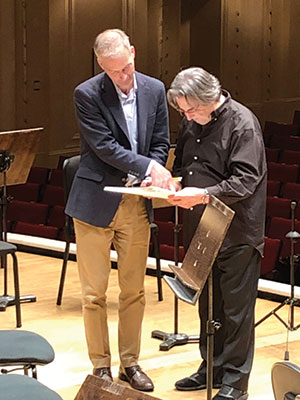
You frequently work as a conductor and clinician frequently. Do you only conduct your own works?
I can’t even tell you how much I love conducting. As with my composing, it has happened somewhat by accident. Sometimes when I am a guest of an ensemble, I will be asked if I want to conduct something. I am always curious to try new things. That has evolved into more appearances and more gigs with all types of ensembles. I take conducting very seriously and prepare as much as I possibly can. I want to be the one who knows the music the best. It is a chance for me to make music with people, which I don’t get to do in my composing work. I started performing in an ensemble at age 10. That is a part of music-making I miss. I take any chance I get to conduct and share my love of music with people.
At first, I was often asked to conduct my own music, but now I am getting invitations to conduct other people’s music, which I love. As a composer, I get to approach the music of other composers from this point of view. I try to think about how a piece develops and what the composer was trying to express. I love trying to figure out those puzzles as a conductor. It can be scary to stand in front of a group of 40-80 fantastic musicians, each with their own opinions of how the music should go. I know what it is like to sit in an ensemble and now I’m standing in front of those people. I take it seriously and do the best I can.
Jim Stephenson has enjoyed premieres in all walks of the musical landscape, including The Chicago Symphony (Muti), San Francisco Ballet, Boston Pops, and “The President’s Own” U.S. Marine Band. His award-winning catalog contains three symphonies, and concertos and sonatas written for nearly every instrument, with premieres having been presented by renowned musicians across the globe. His 2nd symphony – VOICES – has been performed over 40 times, and has won two major awards.

